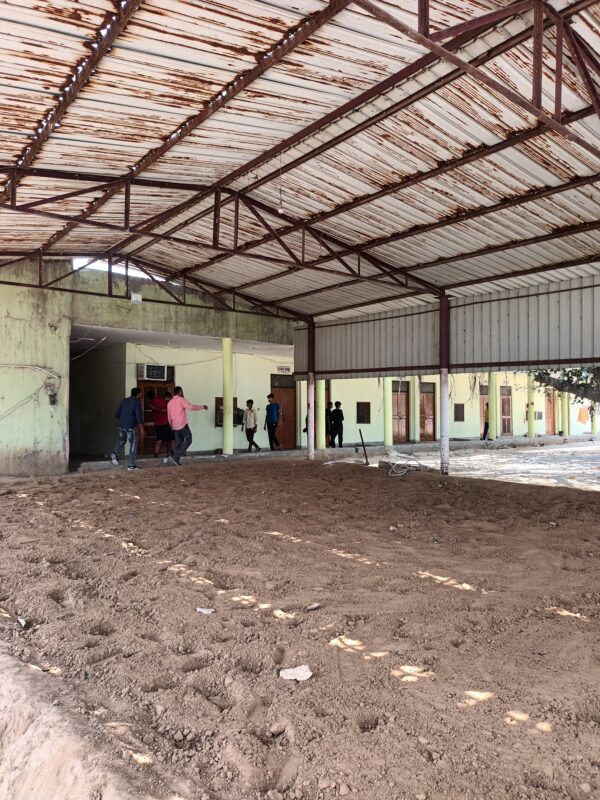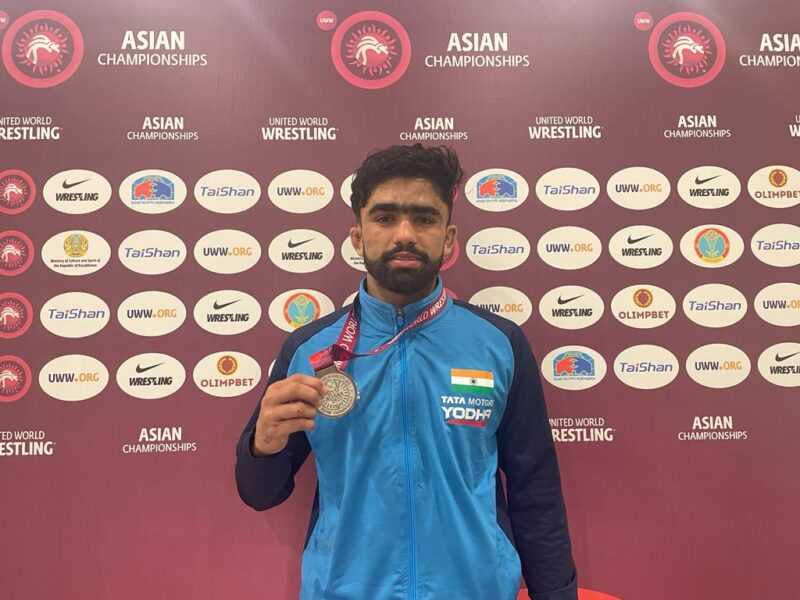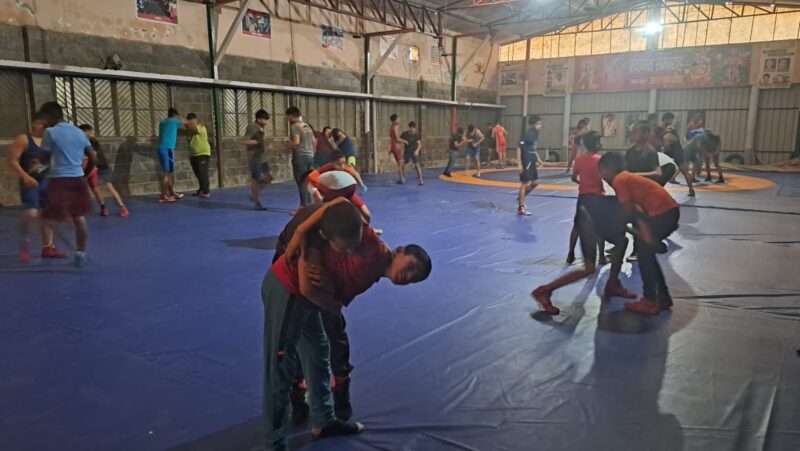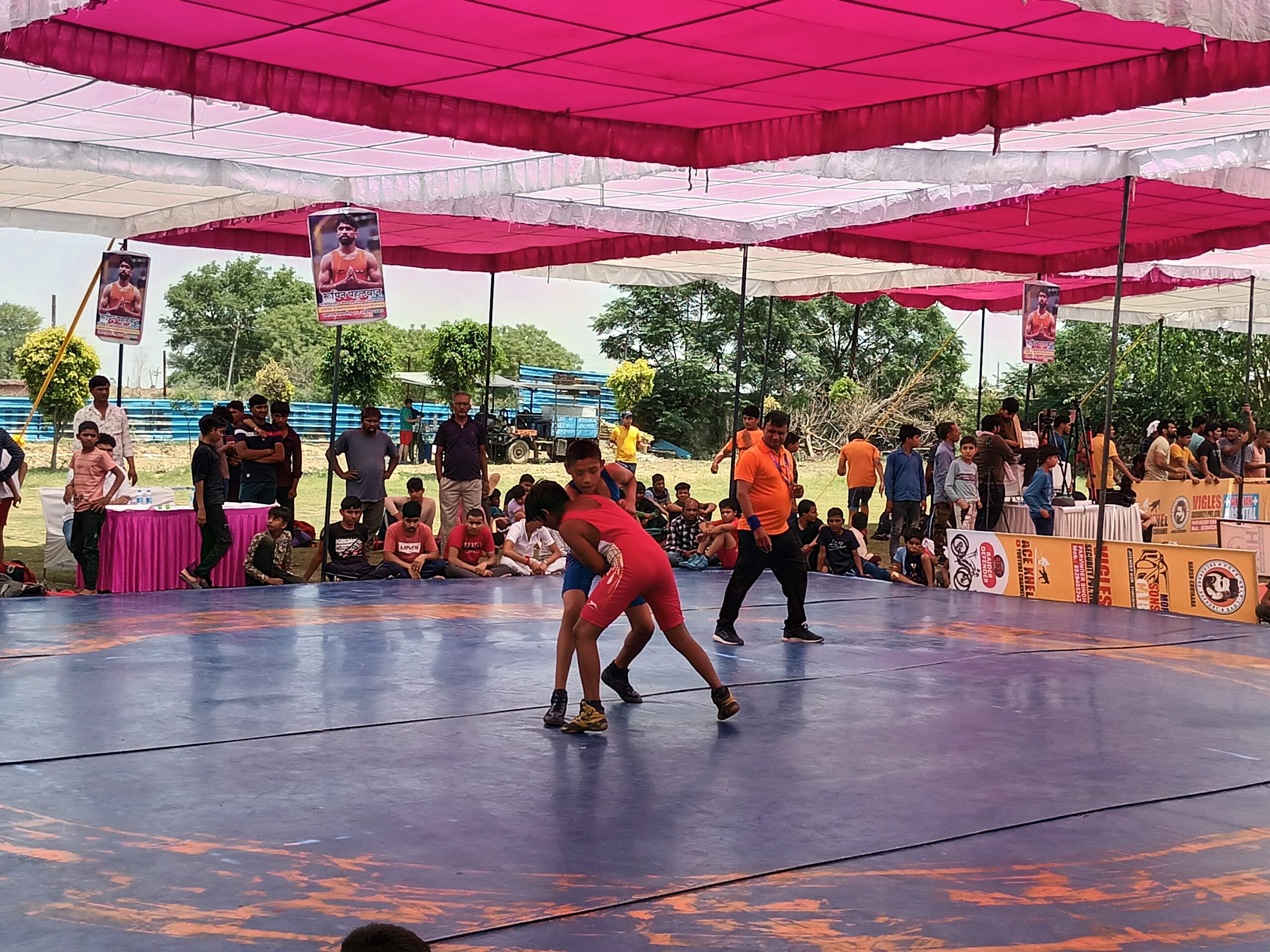Eight years ago, the family of Ram Nath Sharma, a successful businessman from Shafiabad in Haryana, took the initiative of setting up a centre for Greco-Roman style of wrestling in the village that borders North Delhi.
India has deep roots in freestyle wrestling. And, there has been a smooth and successful transition from wrestling on mud akhara or dangal to mat, on which international level freestyle competitions are conducted. Even at the national level, it is mandatory to organise competitions on mat.
But the country has lagged in the Greco-Roman or the European style of wrestling.
India is yet to win a medal at Olympics in the category and all their seven medals in wrestling have been clinched by freestyle wrestlers, including Bajrang Punia and Sakshi Malik, who are currently protesting at the Jantar Mantar.
At the Asian Games, Greco-Roman exponents have won just nine of the 59 medals by Indian wrestlers.
But according to Mahavir Prasad Bishnoi, Dronacharya Awardee in wrestling, Greco-Roman category is gaining popularity ever since the first national championships in the category was organised in 1986.
The Shafiabad wrestling academy has produced as many as 15 Greco-Roman wrestlers, who have won medals at the international level including Asian Wrestling Championships in the last five years.

The academy is also home away from home for budding athletes as it has residential facility.
The biggest draw of the Shafiabad centre, however, is 19-year-old Rupin, who recently won silver in men’s 55kg Greco-Roman category on his debut at the Asian Wrestling Championships in Kazakhstan.
Rupin owes his success to the Shafiabad academy as he got ample support when he was facing hardship following the death of his father in 2019.
“Silver medal at the Asian Championships has given a big boost to my confidence,” said Rupin, before adding that his next goal is a podium finish at the Asian Games scheduled to be held from September 23 to October 8 in Hangzhou, China.
At the Asian Games, Rupin will shift to upper weight — 60kg, which is one of the six Olympic weight categories at the 2024 Paris Olympic Games.
The other five Olympic weight categories are 67kg, 77kg, 87kg, 97kg and 130kg.
Fight with the family
After his father’s demise, Rupin got embroiled in a dispute with his extended family. He had to make a choice — either focus on wrestling or quit sports and fight with relatives.
Rupin preferred wrestling!
It has been over two years since he last visited his mother and sisters who stay in Guhna, Haryana. He cannot go because he faces the risk of being beaten.
“Shafiabad training centre is my home now,” Rupin explained. “I don’t feel homesick but enjoy my practice as the main goal is to achieve something big in life through sports. I have been training in Shafiabad since 2018.”
Former international and Railways wrestler, Surinder Kadian has been the guiding force behind young wrestlers of the area, including Rupin.
“During my spare time, I oversee training of wrestlers at the Shafiabad wrestling academy,” Kadian, who is also the head coach of Railways’ Greco-Roman team, told Patriot.
Rupin was a freestyle wrestler but switched to Greco-Roman in 2018. Since then, he hasn’t looked back.
In 2019, he won bronze at the Cadet World Wrestling Championships. That helped him land a job in Railways via sports quota in 2020.
“I am happy that I am moving in the right direction,” Rupin added.
There are around 40 wrestlers who stay in the academy like Rupin, while an equal number come for regular practice in the morning and evening.

The academy has basic facilities like indoor wrestling hall and mud akhara. But the gym is ordinary.
Bishnoi says modern equipment, including sauna bath and techno gym, are a must for advance practice.
“There is a need to invest more at the grassroot level to give fillip to wrestling in India,” he added.
Despite meagre resources, the young Greco-Roman wrestlers have displayed passion.
“Freestyle wrestlers have made a big impact at the Olympic Games, but Indian Greco-Roman wrestlers will shine in future,” Rupin added.
Roots of the academy
Wrestling is the most successful discipline for India at the Olympics after hockey (12 medals) and most of the medals (freestyle) have come since the 2008 Beijing Games in China. Prior to 2008, the country had only one medal in the sport and that was back in 1952 when KD Jadhav earned a bronze.
Sushil Kumar (2008, bronze), Sushil Kumar (2012, silver), Yogeshwar Dutt (2012, bronze), Sakshi Malik (2016, bronze), Bajrang Punia (2020, bronze) and Ravi Dahiya (2020, silver) have won medals at the Olympics over the last 15 years.
Motivated by India’s improving performance, Sharma, whose son Nitin has also won a medal in Greco-Roman at the Asian Championships, set up a platform for wrestling in the village so that youngsters from the area could benefit.
“We must have spent over Rs 1 crore to set up an indoor hall and accommodation for wrestlers,” Sharma added.
“Our next goal is to install an air-conditioner at the indoor hall. It might take six to 12 months to raise funds but that is the next target. Better facilities would mean better performance.”
Sharma says that like-minded people in the village have stepped forward, although his family is the biggest contributor.
“My son is into wrestling. So, I wanted to give back to the community,” added Sharma.
The academy has seven coaches on its payroll.
“The average monthly salary of the coaches is Rs 30,000,” Sharma said.
“Wrestlers staying in the academy pay a monthly fee of Rs 5,000 for boarding and lodging.”
The Sports Authority of India (SAI) has also appointed one wrestling coach at the centre.
Kadian juggles time between office and coaching.
“After my duty hours, I try to devote as much time as possible to polish the skills of the promising wrestlers,” Kadian explained.
According to Kadian, Indian Greco-Roman wrestlers are better in endurance, while the Europeans are good in technique.
“That is why we go to Europe for sparring,” the coach added.
The ongoing protest by some of the elite Indian wrestlers, including two-time Olympian Vinesh Phogat, against the functioning of the Wrestling Federation of India (WFI), is gradually impacting practice of other wrestlers.

For example, Rupin’s international exposure tour to Russia is yet to be cleared by the Sports Authority of India (SAI).
The sports ministry has set up an ad-hoc panel to oversee the functioning of the WFI until fresh elections for the body are conducted.
“To prepare for the Asian Games, a group of wrestlers was supposed to go to Russia for a month’s training but the proposal is yet to be approved by SAI, which is a technical skills arm of the sports ministry,” Rupin added.
The ongoing protest could also spoil Indian team’s chances at the 2023 World Wrestling Championships, a qualifying event for the 2024 Paris Olympic Games, scheduled to commence on September 16 in Belgrade, Serbia.





